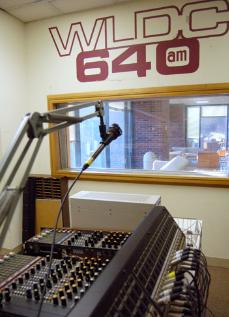The time stopped long ago. The wall clock’s hands sit frozen with the last stroke landing on 6:40. The room is silent-void even of the ticking of the clock.
Next to the browned analog clock reads a sign of a past that one man is hoping to revive.
The sign reads WLDC 640, signaling a time many ticks ago.
Sitting in the corner of fourth floor of the Music/Communications Complex is a room locked and cut off from the Loyola community for the past 10 years.
Music Industry Studies Director John Snyder is hoping to open that door.
Snyder has proposed a radio station at Loyola that would use the already-existing radio facility in that room. The proposal is awaiting approval by University President the Rev. Kevin Wildes, S.J.
Wildes wrote in an e-mail Wednesday that he has not yet been unable to assess the proposal.
The proposal, co-written by marketing senior Nick Thomas, was first sent to the Board of Communications in the spring. The board approved the proposal, after a decade without a campus radio station.
Snyder said the idea came to him in the spring when he was looking of ways to facilitate and serve the community in the wake of Hurricane Katrina.
“It’s my idea to start companies that would be advantages to the community,” Snyder said. “I’m very into the community. I thought we gotta get into the game.”
According to the 25-page proposal, projected start-up costs are $5,325. Equipment to purchase includes microphones, a mixing board, compact disc players, various software, a computer, an external hard drive, tape decks and a telephone switch. The projected annual income based on advertisement is $10,615.
Other than broadcast music and live performances, the radio program will include on-campus music events, interviews with bands and serve as an outlet for professors, students, sports and general campus news.
Loyola’s Music Industry has already secured pledges of donations from Web Antics, an Internet development firm specializing in streaming audio and visual media that would provide equipment and expertise to make the station operational. Loyola’s Information Technology has also pledged equipment valued at $1,400.
Space for a studio and administrative offices have already been identified in the basement of the Danna Center, in the old office of Parking Services, according to the proposal.
The last campus radio program at Loyola WLDC 640 was headed by former professor Mary Blue. Blue, who served as faculty adviser, said in a 2000 edition of The Wolf Magazine that the station was disbanded due to a lack of interest from students.
Blue, who now serves as an instructor at Tulane University, did not respond to request for an interview by press time Wednesday. According to a letter sent in the spring by mass communication professor Cathy Rogers to Snyder, the last proposal for a radio station was priced at about $25,000.
STATIC APPROVAL
The road to approval has not been easy for Snyder and Thomas. They received mixed responses and were sent on varying paths to get their proposal approved.
After the first vote of approval from the Board of Communications, Snyder was asked to return and address issues brought by one board member absent of the first meeting.
Snyder said he addressed those issues and, because of the nearing end of the Spring 2006 semester, was left in limbo. Now, six months later, Snyder awaits approval from Wildes before he can act on his proposal.
“It seemed like a piece of cake,” Snyder said. “I was told to write a proposal, so I did and it was unanimously approved.
“I think they thought we offended them by not going directly (to broadcast). I’m sorry it happened. I certainly didn’t mean to offend anyone if I did. I was just following bread crumbs and I thought it led to (Board of) Communication.”
One proponent of Synder’s proposal is Robert Thomas, interim director of the School of Mass Communication, who is excited about the possibilities of radio on campus.
“It gives Loyola a venue,” said Thomas. “People of other departments would have access to (Loyola Radio), it would be a chance to showcase Loyola to the community.
“This next year will be very convergent,” he said of collaborative programs within the School of Mass Communication. “I will be shocked if this doesn’t go through.”
ONLINE IN THE MEANTIME
Snyder, who has no background in radio, decided to take measures into his own hands.
With a group of about 20 students Snyder was able to produce an online radio station without the help of Loyola. His team of students has produced nightly shows since this summer via NewOrleansRadio.com.
Pending approval Snyder hopes to bring his core group of students up to the fourth floor and see that the clock can tick once again.
Michael Nissman can be reached at mwnissma@loyno.edu.






